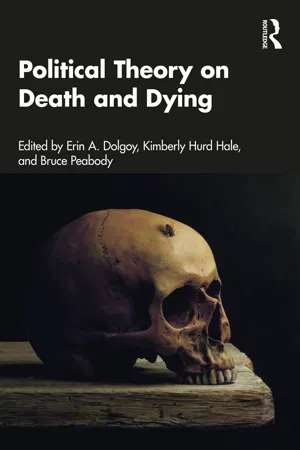
Political Theory on Death and Dying
- 478 pages
- English
- ePUB (mobile friendly)
- Available on iOS & Android
Political Theory on Death and Dying
About this book
Political Theory on Death and Dying provides a comprehensive, encyclopedic review that compiles and curates the latest scholarship, research, and debates on the political and social implications of death and dying.
Adopting an easy-to-follow chronological and multi-disciplinary approach on 45 canonical figures and thinkers, leading scholars from a diverse range of fields, including political science, philosophy, and English, discuss each thinker's ethical and philosophical accounts on mortality and death. Each chapter focuses on a single established figure in political philosophy, as well as religious and literary thinkers, covering classical to contemporary thought on death. Through this approach, the chapters are designed to stand alone, allowing the reader to study every entry in isolation and with greater depth, as well as trace how thinkers are influenced by their predecessors.
A key contribution to the field, Political Theory on Death and Dying provides an excellent overview for students and researchers who study philosophy of death, the history of political thought, and political philosophy.
Frequently asked questions
- Essential is ideal for learners and professionals who enjoy exploring a wide range of subjects. Access the Essential Library with 800,000+ trusted titles and best-sellers across business, personal growth, and the humanities. Includes unlimited reading time and Standard Read Aloud voice.
- Complete: Perfect for advanced learners and researchers needing full, unrestricted access. Unlock 1.4M+ books across hundreds of subjects, including academic and specialized titles. The Complete Plan also includes advanced features like Premium Read Aloud and Research Assistant.
Please note we cannot support devices running on iOS 13 and Android 7 or earlier. Learn more about using the app.
Information
1Memory and Mortality in Homer’s Odyssey
Odysseus’ Curious Forgetfulness
Table of contents
- Cover
- Endorsements
- Half Title
- Title Page
- Copyright Page
- Contents
- List of Contributors
- Acknowledgments
- Introduction
- 1 Memory and Mortality in Homer’s Odyssey
- 2 Confucian Authority and the Politics of Caring
- 3 “Every Form of Death”: Thucydides on Death’s Political Presence
- 4 Mortality, Recollection, and Human Dignity in Plato
- 5 Good Old Age: Aristotle and the “Virtues” of Aging
- 6 The Buddha, Death, and Taxes
- 7 Flourishing toward Dissolution: Epicurus on the Resilience of Tranquility
- 8 The Political Philosophy of Death in Laozi
- 9 The Bhagavad Gītā and Paradox of Death
- 10 Life and Death as a Political Act: Cicero and the Stoics
- 11 Prenatal and Posthumous Nonexistence: Lucretius on the Harmlessness of Death
- 12 The Road to Freedom: Seneca on Fear, Reason, and Death
- 13 Continuity Without Corruption: The Political Theology of Death in St. Augustine
- 14 Jihād for the City: How Alfarabi Discourages, and Encourages, Death in Battle
- 15 Techniques for the Social Self: Abū Ḥāmid al-Ghazālī and the Remembrance of Death
- 16 Death and Dying, Mortality and Immortality in Moses Maimonides
- 17 The Young, the Old, and the Immortal: Machiavelli on Political Health and Aging
- 18 Death in Montaigne’s Essays
- 19 When “Every Third Thought Shall Be My Grave”: Shakespeare’s King Lear and The Tempest
- 20 Francis Bacon on “the Dolours of Death”
- 21 Descartes on How We Should Relate to Death
- 22 “The Wages of Sin”: Morality and Mortality in John Milton’s Paradise Lost
- 23 A Liberation from Fear: Benedict de Spinoza on Religion, Philosophy, and Mortality
- 24 Thomas Hobbes on the Uses and Disadvantages of Death for Political Life
- 25 The Role of Death and Eternity in Locke’s Political Philosophy
- 26 Montesquieu on Death, Liberty, and Law
- 27 Can Philosophy Console Us?: Hume’s Understanding of Mortality
- 28 Jean-Jacques Rousseau on the Fear of Death and the Happiness of Life
- 29 Adam Smith and Dying Peacefully
- 30 Nature, Second Nature, and Supernature: Death and Consolation in the Thought of Edmund Burke
- 31 Kant on Death and the Purpose of Human Life
- 32 Overcoming the Mortal Diseases and Short Lives of Republican Governments: Publius and Political Immortality
- 33 Hegel on Death and the Spirit
- 34 Through the Valley of the Shadow of Death: Søren Kierkegaard’s Philosophy of Love
- 35 Immortality and Angst in Tocqueville’s America
- 36 “What Is Odious in Death Is not Death Itself, but the Act of Dying”: John Stuart Mill on the Political Philosophy of Death and Dying
- 37 Death and Dynamism in Nietzsche’s Political Philosophy
- 38 Facing Death Fearlessly, So Others Can Live Without Fear: Gandhi’s Philosophy as Art of Dying
- 39 “An Earthly Immortality”: Arendt on Mortality, Politics, and Political Death
- 40 Death in Martin Heidegger’s Being and Time
- 41 Make Live and Let Die: Michel Foucault, Biopower, and the Art of Dying Well
- 42 Beauvoir’s Philosophy of Death and Aging
- 43 Metamorphoses: Gilles Deleuze on Living and Death
- 44 Jacques Derrida on Death, the Death Penalty, and Mourning
- 45 Alasdair MacIntyre and the Twilight of the Virtues
- Index